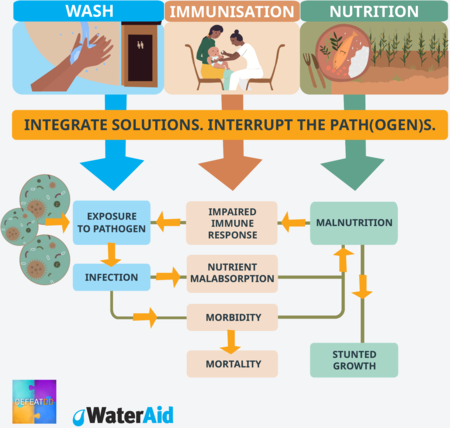Combining clean water, decent toilets and child health measures could save 700,000 children a year, research finds
Combining clean water, decent toilets and good hygiene with routine childhood vaccinations and nutrition support could potentially save the lives of as many as 697,000 young children annually, and prevent billions of harmful bouts of diarrhoeal illness and pneumonia in under-fives each year, new research from WaterAid and PATH has found.
The analysis by WaterAid and PATH’s Defeat Diarrheal Disease (Defeat DD) Initiative shows that major health gains and improved cost-effectiveness are possible if decision-makers act now to coordinate, integrate and invest in child health and WASH interventions.
Investing in integrated actions in the early years of a child’s life can have a much greater impact on reducing child mortality and morbidity than can separate health and WASH interventions. The report draws on a statistical modelling of the potential impact of integrating routine vaccinations and nutrition interventions with WASH to estimate the reductions in child mortality and morbidity that would be possible if integration was taken to scale. It also draws on evidence from the World Bank and others that supports the argument that integrated approaches can have greater impact. The report also highlights case studies from Madagascar, Brazil and Nepal.
We argue that taking integrated action can create a positive cycle that builds human capital, strengthens economies, reduces future healthcare costs and contributes to national development.
The report pushes decision-makers to act on the issue in three ways:
- Coordinate: improve coordination between ministries of health and ministries responsible for WASH, and between teams within donor agencies.
- Integrate: rapidly innovate, assess and scale-up integrated programmes.
- Invest: put in place domestic and international funding that supports and encourages an integrated approach.
To read the full report and the statistics behind it, click here to go to the report >
What can donors do? Read our report two-pager here >
Last year we also released the report Recipe for success about WASH and stunting, click here to read the report >
